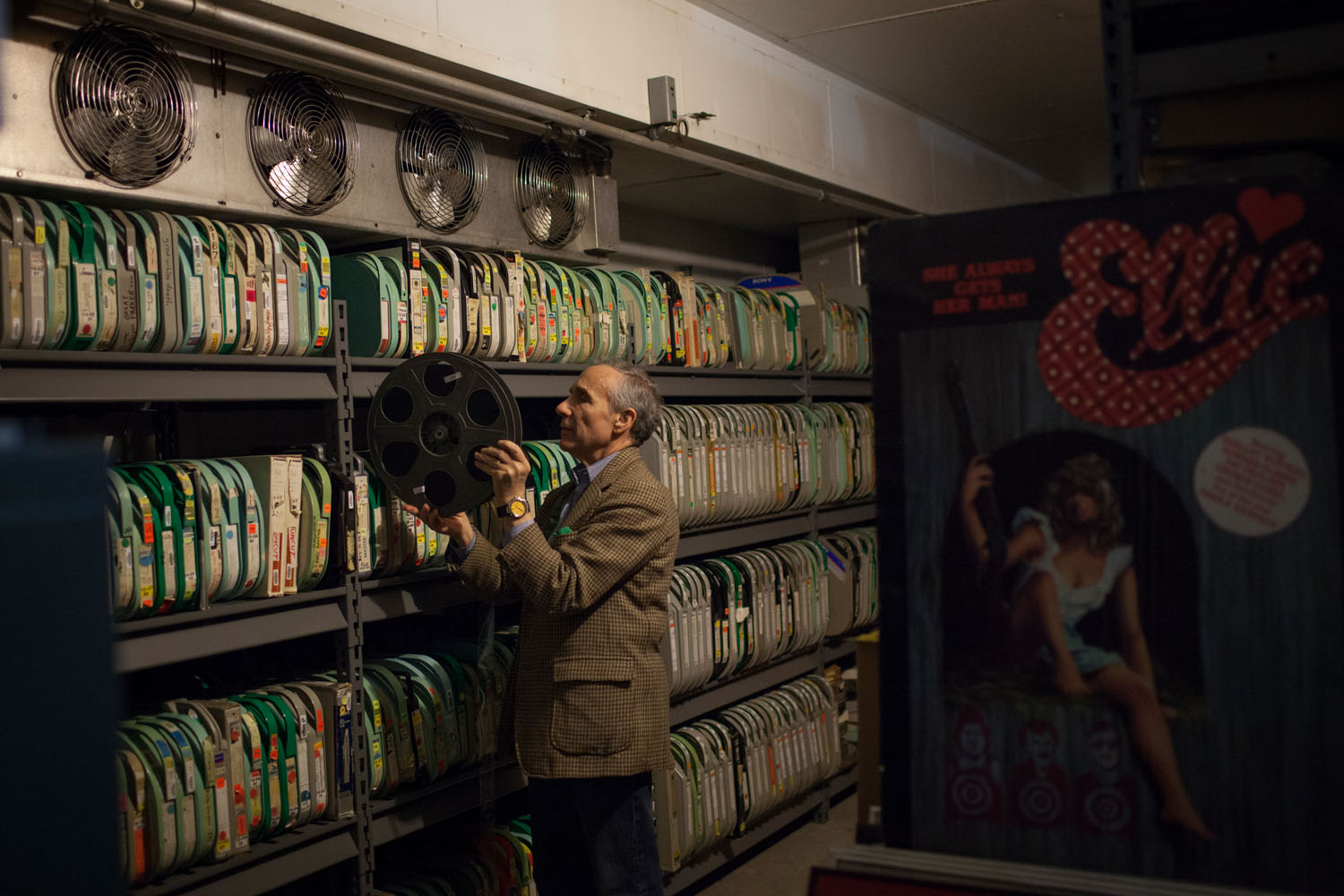Lloyd Kaufman, President of Troma Entertainment at his desk in The Troma Building, in Long Island City, N.Y., on Feb. 15, 2013.
Once upon a time, sex sold—and so did ultra-low-budget movies known for their double-entendre-laden scripts, extreme depictions of raunch and violence, and lots of radioactive slime. Not so anymore. That’s why, on a crisp late-January afternoon, in a building in the Long Island City area of Queens, New York, the production staff at Troma Entertainment—“Almost 40 years of reel independence!” its proud motto—is shooting a promotional video for their first-ever campaign to crowdfund a movie. The camera rolls as Troma’s president and public face, Lloyd Kaufman, enters his office.
“We’re going to enter the nerve center of the Troma building, the reason that we’re still around and something the studios don’t have,” he tells the camera. “They do not have a young, intelligent and smooth-working work force like this, let me tell you.” He opens the door to a dozen actors and crew members covered in fake blood, drooling green ooze and simulating sexual acts with mutant-body-part props. This, apparently, is a normal work day at Troma.
Their current project—and the one that is the object of their fundraising efforts—is a documentary called Occupy Cannes. The idea is to rent a theater at this year’s Cannes Film Festival to peddle their new film Return to Nuke ‘Em High—it involves a mutant glee club—to international distributors, and bring along a film crew to capture the entire process.
“We can make a documentary that will show from the inside-out how this festival—and the very concept of a film festival—has been perverted,” says Kaufman. For that, he’ll need $50,000.

Kaufman files a reel from the 35mm print of the 1987 film Troma’s War in the archives at Troma’s offices.
Asking your potential audience for the money needed to make a movie is no longer unusual, but it’s a new step for Troma. For nearly 40 years, they’ve paid for their movies themselves—often turning a profit. The building that houses Troma also serves as a prop warehouse, distribution center and film vault that contains over prints of more than 800 movies, going back to a 1969 student film by Kaufman. But the old model isn’t cutting it anymore, so the company turned to its fans online for funding. Kaufman says that there was no money left at all after Return to Nuke ‘Em High was made—and though Troma’s publicity director Justin Martell says that’s hyperbole, he confirms that there’s not enough revenue coming in to make Occupy Cannes the way Troma has done business before. Crowdfunding, apparently, is no longer just for up-and-comers. Here’s a legit, established business turning to a new model. So could Troma’s experience with crowdfunding, like the first mutant arm that emerges from a bucket of toxic waste, be the harbinger of the end of an old brand of independent filmmaking and the beginning of a new species of production company?
Here’s how it used to work:
Troma, founded in 1974 by Kaufman, 67, and his Yale classmate and business partner Michael Herz, made money. The movies created and distributed by the company—perhaps most notably 1983’s The Toxic Avenger—were produced on relatively tiny budgets, the money for which came from private investors and, later, when the company’s profits were more stable, from Kaufman’s and Herz’s wallets. They were purposefully contrarian; the back-story of The Toxic Avenger is that a Variety article about how horror movies were not commercially viable inspired them to make a horror movie. Their movies might not open in many theaters, but word of mouth would help them spread to cineplexes across the country and home-video sales would continue long after. A 1984 Forbes article about the company gave the example of an investor who put about $50,000 into a Troma movie—10% of the sample budget—in return for 5% of profits; that hypothetical person could reliably expect to double his money within four years. A Troma investor, Kaufman points out, was beating the stock market.
(MORE: On Location in Cannes)
A chunk of that profitability came from international distribution deals, many of which were struck at the company’s annual pilgrimage to the Cannes Film Festival. It was a ritual Kaufman started in 1971, when he rented a theater there to show his first 35 mm film, Sugar Cookies. “What little money we had I wanted to try to use for promotion, so I slept on the beach,” he recalls, “and went around advertising by putting leaflets on parked cars, right on the croisette.” Once the company started going to the festival, they became infamous for using street theater to attract attention to their screenings—you don’t have to be in the festival to rent a movie theater in the city—and in the late ‘90s would spend up to $100,000 putting the voyage together, a sound investment at a time when the festival was also full of indie companies looking to license Troma’s content.
They’ve even done the Cannes documentary thing before, with 2002’s All the Love You Cannes. But All the Love concluded with Troma’s expulsion from their local office space, and the company has not been a major presence at the festival since then.
And the changes don’t stop with the fact that, as Kaufman says, he would never in a million years be permitted to sleep on the beach at Cannes these days.

